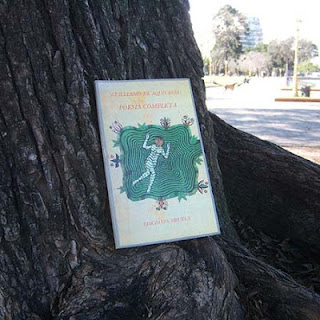Una lectura que comienza
Figuritas encontradas — imposibles de abandonar ::: Todo esto debe ser considerado como dicho por un personaje de novela — o más bien por varios. (Barthes) ::: drmoure@yahoo.com.ar ::: Las "versiones al castellano" provienen de mi gusto y parecer
viernes, 30 de noviembre de 2012
miércoles, 28 de noviembre de 2012
domingo, 25 de noviembre de 2012
Hopper at Home ((( First Presentation )))
Lighthouse Hill
(1927)
We came down the path
and the light blew
the west
Excursion Into
Philosophy (1959)
My heart was the sun
on the wall
at my back
Gas (1940)
One car arrives
One car leaves
I stay
Compartment C, Car
293 (1938)
The words were not
good —
sad thing to realize
at evening and
middleway
Chair-car (1965)
Some were going
Some were coming
I was just sitting in
for the ride
Nighthawks (1942)
She kept talking
And I kept thinking
why was I not drunk
Railroad Sunset
(1929)
The sun carried away
the train
and we were gone
Road in Maine
(1914)
I waited under the
evening lights
but it was never
enough
Summer Evening
(1947)
You said not a word
under the still light
good-bye you said not
Self-portrait
(1925-1930)
He wanted to paint the
sunlight
he said
and the sunlight came
A Woman in the Sun
(1961)
The sun gave her
a name
and she answered
Apartment Houses
(1923)
I looked at her every
morning
and she didn't know
I even had eyes
Approaching a City
(1946)
I departed with no
memory
and slept —
Now I smile
Light at Two Lights
(1927)
We walked all day
and said not a word:
the world was our
dirty patch of sand
New York Movie
(1939)
Sitting at the back
we struggled with each
other —
we knew the world was
ending
The Mansard Roof
(1923)
We wanted to go out
but grandpa said it
was too early —
so we decided to climb
House at Dusk
(1939)
She wrote me a letter
but I didn't know how
to read it —
A letter she tore down
Hotel by the
Railroad (1953)
I had to go — you know
It was not a personal
matter
almost
Blue Night (1914)
The clown is dead
Don't shoot the clown
The clown is you
Office at Night
(1940)
Everyday I stayed
after-hours
to read the poems you
wrote —
and then you were gone
El Palacio (1946)
We used to walk by
sundown —
Now I just go to the
roof
and miss you
Automat (1927)
As cold
as coffee
is dark
Drug Store (1927)
My pain was mine to
keep
Came the night my name
So call inward the old
seed
Two Comedians
(1965)
My dance was yours
and mine
your smile
Pennsylvania Coal
Town (1947)
You don't remember
my name
under the lawn
Chop Suey (1929)
You painted me
over your bowl of rice
and forgot my thirst
Prospect Street,
Gloucester (1928)
We lived merrily
and we're dead now
in your eyes
Early Sunday
Morning (1930)
Early — very early
I was looking for you
into a blind place
martes, 20 de noviembre de 2012
miércoles, 14 de noviembre de 2012
Erre con erre
Nos decía Baldomero, entre otras cosas:
“Cuando un
compañero me propuso que lo sustituyera durante varios meses como practicante
de la Asistencia Pública de La Plata, acepté con toda alegría: fuera como
fuera, era salir de Buenos Aires, una hora de tren, un paisaje por la
ventanilla, gentes desconocidas, era viajar”...
Y acá fue
donde tuve que detenerme y volver atrás algunos pasos: ¿una hora de tren?... ¿a
La Plata?... ¿en tren?...
Si miramos en
la biografía de Baldomero, veremos que nació en 1886; vale decir que si podía
ejercer como practicante, debía de tener unos 25 años; esto nos ubicaría
alrededor de 1911 —minutos más, minutos menos.
O sea
que allá por entonces, hace como cien años, se podía viajar en tren a La Plata
desde Buenos Aires ¡y llegar en una hora!
Lo primero que
viene a la mente es que los ferrocarriles andaban mucho mejor que
ahora. Claro que, enseguida, me llegó la voz de la sabiduría popular o, bueno,
puede que no tan popular después de todo sino de alguno que otro habitante del
pueblo que todavía resta, y comprendí que lo que verdaderamente pasaba era que,
por entonces, las horas eran de mejor calidad y duraban más que las de hoy.
Nota :
La cita fue tomada de “Poesía y prosa”,
de Baldomero Fernández Moreno, Centro Editor de América Latina, Buenos Aires,
1968. Este libro está compuesto por selecciones de los libros de Baldomero
realizadas por Nora Dottori y Jorge Lafforgue; la que nos interesa pertenece a
“Vida y desaparición de un médico” publicado en 1957 (póstumamente).
martes, 13 de noviembre de 2012
Antropomorfosis
De hecho nadie puede saber qué es un
animal, en parte porque nadie puede saber lo que es cualquier cosa (Kant dixit) y
además porque parece imposible considerar a un animal sin superponerse
antropomórficamente a él, de donde se siguen las opiniones de mi tía sobre la
maldad de los pumas y las de mi prima sobre la envidia de los gatos o la
clarividencia agorera de las lechuzas.
Julio Cortázar
Territorios
Siglo Veintiuno Editores, México, 1984
Suscribirse a:
Entradas (Atom)





